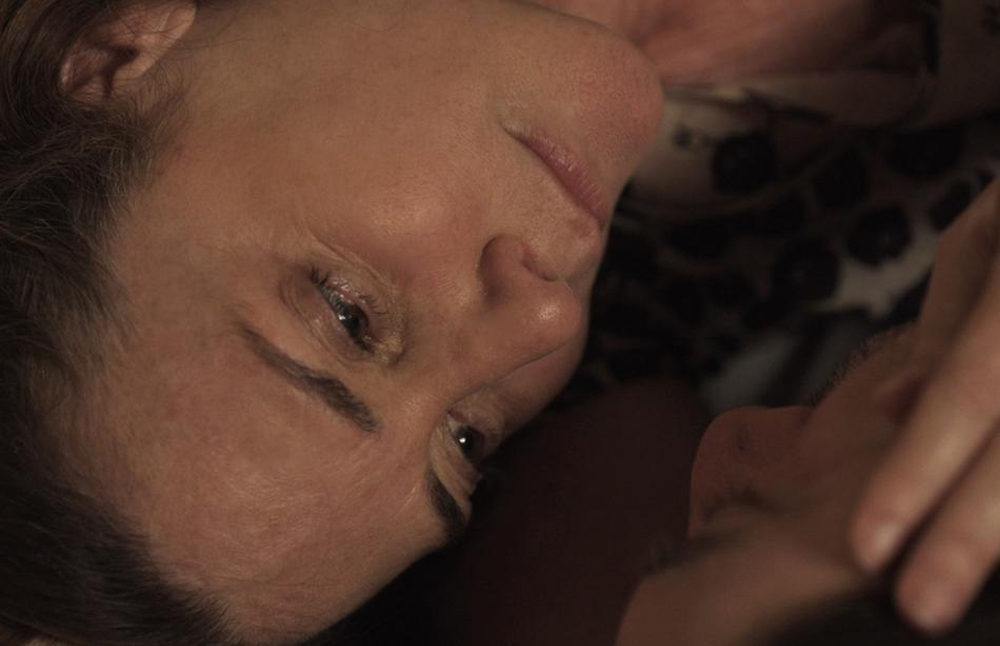There are several things that are shocking about the birth that occurs just minutes into Hilary Brougher’s blistering drama “South Mountain,” setting off a chain of events that upends a family living in the Catskills when it’s discovered that Edgar (Scott Cohen) has cheated on his wife Lila (Talia Balsam) and leaving their kids to take sides. But the most jawdropping aspect might be the logistics that went into getting the scene in the first place, with the writer/director shrewdly figuring out what was necessary to incorporate shots from actress Isis Masoud’s giving birth in real life in Miami while the rest of the production was based in upstate New York.
“Some of what you’re seeing is a re-enactment [by Isis] at eight months [pregnant] and some of it is a real birth that was shot by her [family] — it’s labor, so there were just a couple moments that she gave to the camera in and around her real birth,” says Brougher. “So we had all the footage and we constructed it. She just brought such a great energy to it, I wish she was on set with us.”
As it would happen, Brougher would only meet Masoud in person shortly before the film’s second screening at SXSW where the film recently premiered, having arranged for all the other footage over Skype and brilliantly intercutting it with reaction shots from a frantic Edgar, excited at the prospect of starting one family, knowing he’s going to say goodbye to another with the almost unbearable tension of his private elation of what he’s seeing on his iPhone alone in one room tempered by the inevitable anger he’s going to inspire once he has to deliver the news to those waiting on the other side of the door.
“I wanted the birth to feel undeniably rousing and I didn’t want it to be a bad thing for the audience,” says Brougher. “I wanted to show there’s this whole other undeniable chapter of life beginning that he’s going to have to be a part of, and having the birth in the first act, that’s something I couldn’t have done at a higher budget with story people telling me, ‘No, that has to go in the third act somehow.’ I’m really happy I got to put it where I did and do it the way we did it.”
For longtime fans of Brougher, it’s that last part that tips the scene into full-on joy since the explosive opening perfectly exemplifies the writer/director’s considerable gift for transforming inner turmoil into propulsive action. However, after displaying unparalleled technical and emotional precision in such films such as “Stephanie Daley” and “The Sticky Fingers of Time,” it’s never felt as if Brougher has had full ownership over a film the way she does in “South Mountain,” a stirring drama that may be humble in origin – shot in 15 days at her mother’s house with her husband Ethan Mass serving as the film’s cinematographer, their teenage kids taking roles in Edgar and Lila’s family, and much of the crew comprised of former students she taught at Columbia University – but roars to life as it explores ideas she’s likely had to discard in the past. In a bleak bit of poetry, the film premiered in the very same theater in Austin where her obviously compromised third feature “Innocence” debuted five-and-a-half years earlier.
Whereas that vampire tale felt as if it had the blood sucked out of it by the time it reached the screen, “South Mountain” arrives with plenty to sink one’s teeth into as Brougher gives the spotlight to Balsam as Lila, who is confronted with the unpalatable prospect of starting over as a result of her husband’s indiscretions and tries her damnedest to keep the life she’s invested so much energy into intact. For as much as you can feel the presence of wilderness all around, Balsam’s ferocity turns Lila into the most intimidating force of nature in “South Mountain,” both extraordinary to watch and fearsome in terms of what havoc she can wreak. A day after the film’s premiere at SXSW, Brougher and Balsam were gracious enough to sit down and talk about making the most out of the available resources to retain full creative control over “South Mountain” and creating just the right atmosphere in which the cast and crew could thrive.
How did this come about?
Hilary Brougher: In part, it was because of that film [“Innocence”], which I don’t talk about too much. There were great people involved, but I didn’t have creative control and didn’t even want my name on it because I didn’t feel like I authored it. I was part of it, but it took me apart a little bit and I’ve realized both on a very practical level, I wasn’t going to have an easy time getting another film off the ground on that scale. Also, I really wanted to push myself if I was going to make another film and to create an environment to do that, I realized I was probably going to have to create a very small film that I was in charge of on a lot of levels, so I came up with a film I knew I could make. I didn’t have to really count on too many other people to say “Okay, this is going to happen” and I wanted to line it up with my teaching sabbatical too because I teach full-time. One of the hazards of teaching and trying to produce films is the financing and the casting comes and goes, rises and falls, so I knew if I made a small enough film, I could say I’m shooting it here and it would happen.
So it was this mix of a personal fire to make a film about very, very solid things, to see how much tension I could [wring] out of naturalism, to dig into some themes and ideas about how I wanted to play with space and time and just get back to it. I started making films when I was 14 years old with a Super 8 camera and came to New York and saw how people made independent films and did that in various models. But then I thought, “Wait, there’s a camera my family owns. I can cut on DaVinci Resolve myself if I have to. The means of production are in my hands. Why am I not just trying this?” If I was 25, that’s what I would do. Why not do it now? So I was trying to connect back with the freedom of my younger filmmaking self before I started following the “this is how you should do it” path. That’s why I concocted this film.
Talia, what made this an adventure you wanted to go on?
Talia Balsam: The script. And Hilary. It happened randomly and quickly.
Hilary Brougher: It happened fast.
Talia Balsam: So [it was a] leap of faith. I had seen “Stephanie Daley” and I was struck by a moment in that film where she gets impregnated by the boy and I remember thinking that just seemed so honest and right on, like somebody did that and shot like that. And we met and talked a little bit, but the strength of the script and how she was doing it and how contained it was going to be [made it] a big leap of faith to take on when you don’t have that much time, but I had the benefit of the person shooting it wrote it, so you’re not completely at bay. So there’s no reason you wouldn’t have done this – let’s put it that way.
Hilary Brougher: And the script went through many iterations, by the way. There’s a thriller version, there was a much bigger version at one point – I was trying to write it as an episodic web thing, so it went through a lot of morphing. I knew I had the house and I had a pseudo agoraphobic woman [at the center] – Lila’s not actually agoraphobic anymore, but she began that way, and in that notion what keeps you at home when you should go, so the character evolved.
Talia Balsam: Right, she’s at this point a nester. [laughs]
Hilary Brougher: Now, she’s a nester and clearly she does function and leave the house — we just don’t see it — so the question becomes why do you stay in situations that might not be perfectly healthy? That’s where it grew from. Then a lot of the script was about casting off things that weren’t real.
Talia, was there something that unlocked Lila for you?
Talia Balsam: I think it has to do with where she landed, not necessarily the circumstances. My [own] son was going off to college and I had lost people in my life, so I feel like I was dealing with a lot of things internally that were changing, that were beyond my grasp. I couldn’t do anything. Life was moving forward and I think that’s part of what [Hilary] wrote and that’s what I related to. The other things scene-by-scene, those were the things we could discuss, but the internal part is what I connected to, whether I made a good choice or not.
Hilary Brougher: You did. And we also shot almost in order, which is rare…
Talia Balsam: So it was almost like a play to me.
With that being the case and so little time to prepare, were you having epiphanies as you were playing the character?
Hilary Brougher: I think so! I remember [Talia] saying, “Ohhhh, so she’s nuts” [Balsam laughs] Just at a certain moment, not altogether.
Talia Balsam: Yes, well, that’s like a gift and a totally scary thing to go, “I don’t actually know what that is, but we’re here, we’re doing it.” It’s a little scary. But it’s great material and you always want to come up to it. You don’t want to fail it.
Hilary Brougher: And I look for surprises and maybe try and play with them a little bit, knowing that we don’t have to use them, but we have them. I shoot to have options, to rewrite in the edit room.
Talia Balsam: Given the amount of time, it just added to [having] to make those connections and these histories quickly. Living in a house, making these meals together, the drama of a cast and crew, which is sometimes more than the film itself [laughs] — all these things add to everything and Hilary makes an atmosphere also where it’s like I’m not in a Motel 6. We were at a big beautiful house in the Catskills with a big beautiful kitchen. Everyone was very generous.
Hilary Brougher: Yeah, the crew house was big and you could move around. The shooting house was small. And the flies found some craft service. A tragedy that plagued us the whole time…
Talia Balsam: Yeah, that was real.
Hilary Brougher: We lost takes to flies and…
Talia Balsam: And the heat…
Hilary Brougher: Yeah, it was hot and sweaty even at night. But it was familial — my teenagers were there. It’s my mother’s house, so she moved in with us and was helping out and it was a very small crew, this mix of experienced people and newer people. There’s no grip or electrics running around. It’s really my husband, who shot it, and Maria [Rosenblum], who’s the producer, the editor and the primary first AC, so everybody knew what was going on with everybody else. And one thing the film and the crew mirror is that there was a lot of love. The separations weren’t giant. And that’s the underlying thematic of the film is that as you fall apart, you remain deeply connected and I think that was earned in the chaos, I hope. [laughs] The actors would work off each other really well, so they would help each other find the family conflicts.
Talia Balsam: That part was the least challenging to me. Everybody just worked really well together and I think it shows. [Hilary] picked a good cast.
Speaking of which, how did Scott Cohen come onboard to play Edgar?
Hilary Brougher: He had gotten the script through someone on his team and said, “I think I should play this part,” and I was like, “Okay.” [laughs] He was really psyched to work with Talia and he had a lot of energy and dynamism. I think I might’ve written Edgar as a little bit more bookish on the page, but [there was] always a restlessness that was really important to the character and Scott had that in spades. When I recognized there was this fountain of energy and he conveys just the right amount of love, and that was what was going to make this character who was loving so much that he has to go start a new family. [laughs] He can’t say goodbye to the old one and he had the right sweetness to play this complicated guy in a way that we couldn’t quite hate him. He had this energy of necessity and I thought that’s going to give Lila something to have to really grapple with.
The camera is so lively within such a night space. Was there a lot of blocking of the actors?
Hilary Brougher: I wish we had more time to rehearse and stage. But the actors really knew what they were doing and I really knew the house backwards and forwards. Because it’s my mom’s house and I wrote certain scenes for certain places. There were only a couple switches for rain in the staging. But it’s a huge asset when you as a director have access to the space for a long time before, and/or schedule for it because it was mostly natural light [and] we were creating a schedule around [the light], like when this part of the house was going to look interesting.
Talia Balsam: That’s right. I didn’t even think [while we were shooting, but] you knew what time the dining table would be in the right light.
Hilary Brougher: Yeah, and when the shadows would come in. The fact is it’s a film that didn’t cost a lot of cash, but when nature does it, nature does it best. People say “Oh, it’s beautiful” and it’s like “well, that’s because that’s actually the thing that people spend thousands of dollars and hours trying to get the light just right through the window.”
Was the idea of nature as prominent in the script or did having all the humid days and all the flies [during shooting] amplify it?
Hilary Brougher: I didn’t expect the flies. They came because we were a crew. [laughs] But I knew the humidity might happen and hoped it wouldn’t be too unbearable because it can get pretty muggy up there. The nature was always there, even though it’s a film about people in a house. The house really is on the side of a mountain with bears and wolverines and things coming out of the woods at night, and one of the things I love about my mom’s house is it’s cozy little, but you can feel the wildness around it. Ethan and I did come back and do second pickups, because I’m married to him and I can be like, “Okay, now, the tomatoes are turning brown, so we’d go back and get that shot.” So we came back and got that mountain shot without a crew, and that’s the other beauty of being able to control the gear. We shot a compact schedule [with the actors], but we were able to bring in those elements [later].
Talia Balsam: I remember sitting at a table and there were ants on a glass and you’re just getting these shots where you can of infringement. If you had done that on a [larger-scale production], they’d be like, “We have to set up for that.” No, [you] just grabbed it.
Hilary Brougher: And those are usually the shots that you take and the DP rolls their eyes and you never use. But the irony was [in] our third act [we have] this montage of cutaways that we’d gotten at some point. But it is about the nature and I was happy it sustained. At some point when I was immersed in filmmaking [earlier in my career], I started to think of nature as set dressing and I don’t anymore. I think of us as the set dressing. [laughs] The human story is working within some larger natural rhythm and it’s important for me as a filmmaker to really give landscape a voice. It’s more than just backdrop. It’s got to be a primary force.
What’s it like coming to SXSW?
Talia Balsam: It’s been amazing. Because you go away from something for a while and then you see the end product and it’s so good and it’s being received so nicely. That doesn’t always happen and I feel grateful for that. It deserves it. I felt really happy to be part of something that hopefully will be seen and I’m glad that SXSW has made a home for it.
Hilary Brougher: Yeah, I don’t actually believe that any and all festivals would get it. I think South By got it and this was actually the festival I always wanted it to come to, just on vibe. I can’t really explain why. Watching their programming over the years, I felt like okay, their humanism and vibe line up with us somehow, but I really had no idea because the whole time we’d been making this film, I knew we were working against the grain. If you just say, “Oh, it’s a woman at her house over the course of a summer,” it doesn’t sound very interesting. So that the programmers got it, I’m so grateful and so thrilled. We had most of our cast, most of them seeing it for the first time, so it was pretty emotional because we’re a little family and we were all tearing up after the screening. The other thing about making a movie without a lot of means is you haven’t compensated people adequately with money, so you really want them to be proud and feel like this was worth their time, so I’m very relieved and very grateful. I can’t quite explain why this is the right launching place for it, but I think it really is.
I may be making a connection where there isn’t one, but I saw Talia may be directing soon [as part of the anthology “Everything I Ever Wanted to Tell My Daughter About Men”] – did this give you a nudge in that direction?
Talia Balsam: Yes, I would say on some level. I don’t have any real experience with [directing]. A friend of mine came to me with something and I thought no one’s really asked me to do that and I never thought about doing it , but I reached a point in my life where I was like, “If somebody said yes to you, why don’t you say yes back and try it?” And I liked her story. It’s 17 shorts by first-time women directors and I just think I’m taking another leap. That’s the year for me to try it and I’m interested to see how I function in it. We’ll see.
Hilary Brougher: You’re going to do a great job because I remember how you processed the script, the way you broke it down. You understood it mechanically as well as emotionally, but that’s all there is, really. You just talk to the camera about it.
“South Mountain” is now available on iTunes.




